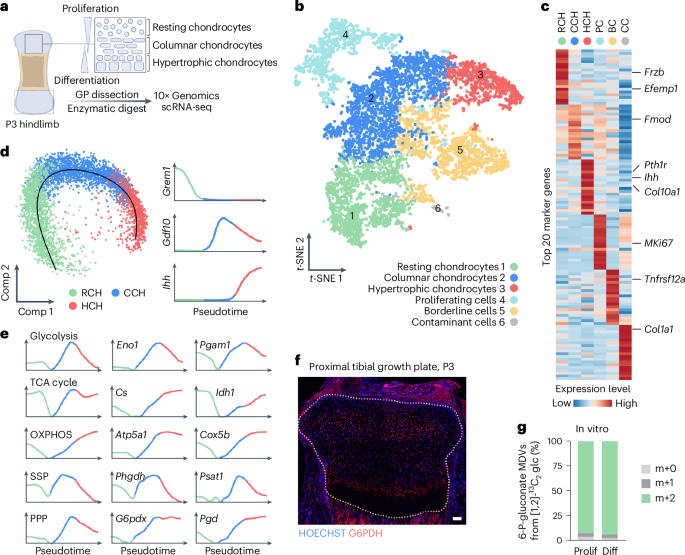The pentose phosphate pathway controls oxidative protein folding and prevents ferroptosis in chondrocytes
IF 18.9
1区 医学
Q1 ENDOCRINOLOGY & METABOLISM
引用次数: 0
Abstract
Bone lengthening and fracture repair depend on the anabolic properties of chondrocytes that function in an avascular milieu. The limited supply of oxygen and nutrients calls into question how biosynthesis and redox homeostasis are guaranteed. Here we show that glucose metabolism by the pentose phosphate pathway (PPP) is essential for endochondral ossification. Loss of glucose-6-phosphate dehydrogenase in chondrocytes does not affect cell proliferation because reversal of the non-oxidative PPP produces ribose-5-phosphate. However, the decreased NADPH production reduces glutathione recycling, resulting in decreased protection against the reactive oxygen species (ROS) produced during oxidative protein folding. The disturbed proteostasis activates the unfolded protein response and protein degradation. Moreover, the oxidative stress induces ferroptosis, which, together with altered matrix properties, results in a chondrodysplasia phenotype. Collectively, these data show that in hypoxia, the PPP is crucial to produce reducing power that confines ROS generated by oxidative protein folding and thereby controls proteostasis and prevents ferroptosis. Loopmans et al. show that the pentose phosphate pathway in chondrocytes provides reducing power to ensure proteostasis necessary for bone lengthening.


戊糖磷酸途径控制氧化蛋白折叠并防止软骨细胞中的铁下垂
骨延长和骨折修复依赖于在无血管环境中发挥作用的软骨细胞的合成代谢特性。氧气和营养物质的有限供应使人们对如何保证生物合成和氧化还原稳态产生了疑问。本研究表明,戊糖磷酸途径(PPP)的葡萄糖代谢对软骨内成骨至关重要。软骨细胞中葡萄糖-6-磷酸脱氢酶的缺失不会影响细胞增殖,因为非氧化PPP的逆转会产生核糖-5-磷酸。然而,NADPH产生的减少减少了谷胱甘肽的再循环,导致对氧化蛋白折叠过程中产生的活性氧(ROS)的保护能力下降。受到干扰的蛋白质静止状态激活了未折叠的蛋白质反应和蛋白质降解。此外,氧化应激诱导铁下垂,这与改变的基质性质一起,导致软骨发育不良表型。综上所述,这些数据表明,在缺氧条件下,PPP对于产生还原能力至关重要,从而限制氧化蛋白折叠产生的ROS,从而控制蛋白质静止,防止铁下垂。
本文章由计算机程序翻译,如有差异,请以英文原文为准。
求助全文
约1分钟内获得全文
求助全文
来源期刊

Nature metabolism
ENDOCRINOLOGY & METABOLISM-
CiteScore
27.50
自引率
2.40%
发文量
170
期刊介绍:
Nature Metabolism is a peer-reviewed scientific journal that covers a broad range of topics in metabolism research. It aims to advance the understanding of metabolic and homeostatic processes at a cellular and physiological level. The journal publishes research from various fields, including fundamental cell biology, basic biomedical and translational research, and integrative physiology. It focuses on how cellular metabolism affects cellular function, the physiology and homeostasis of organs and tissues, and the regulation of organismal energy homeostasis. It also investigates the molecular pathophysiology of metabolic diseases such as diabetes and obesity, as well as their treatment. Nature Metabolism follows the standards of other Nature-branded journals, with a dedicated team of professional editors, rigorous peer-review process, high standards of copy-editing and production, swift publication, and editorial independence. The journal has a high impact factor, has a certain influence in the international area, and is deeply concerned and cited by the majority of scholars.
 求助内容:
求助内容: 应助结果提醒方式:
应助结果提醒方式:


